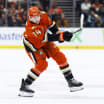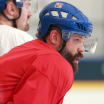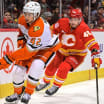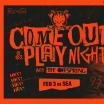Organist Imber Infuses Ducks Games at Honda Center with Delightful Tone
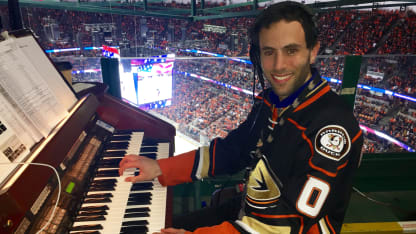
"That's 'Happy,'" Imber quickly determines, referring to the song by Pharrell Williams. "But I'm not sure which key."
The Ducks' arena organist runs his hands across the keyboard and bangs out a few chords, trying to match the band's sound. After about three attempts within 10 seconds, he has it figured out.
"C sharp," Imber says, as he nods his head. "That's C sharp."
He waits for the band to wrap up their brief set and for the words "organ go," to come through his headset from Anaheim Ducks Entertainment Manager Davin Maske. Imber then begins to play, as the Ducks prepare to take on the Edmonton Oilers for Game 1 of the Second Round of the 2017 Stanley Cup Playoffs. Whether the Ducks win or lose this game, Imber is undoubtedly enjoying himself.
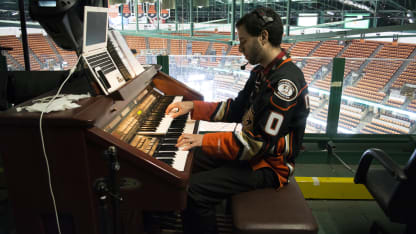
"The words 'organ' and 'fun' are two words that don't often get associated together." Imber says. "I'm trying to change that."
For the past two seasons of Ducks hockey, Imber has taken his love for music and combining it with something else he loves just as much - sports.
Classically trained in piano since the age of seven, Imber began his college years at UC Irvine by moving a portable Casio keyboard with him into the dorms. The keyboard had a drawbar organ function on it, so he decided to explore the range of sounds he could produce.
He began researching and studying the instrument, experimenting with the layering of sounds and learning how they interact with each other. And through hours of trial and error, Imber taught himself how to play the organ.
"I love the sound of it," Imber says, "and how it's such a different dynamic than the piano."
Imber's path to playing at Honda Center took him through another well-known Southern California sports venue, Dodger Stadium. Upon graduating from UCI in 2010 with degrees in social ecology and criminology, law and society, Imber took a job with the Dodgers in their security department, where he was among the first to incorporate the use of statistic-based analysis to their gameday efforts.
Each night after work, as he waited for the LA traffic to subside, Imber would practice his musical craft by playing on the Dodger Stadium organ, a Roland Atelier digital model that provided rich sounds ranging from a classical church organ to a whimsical theater organ, and every solo instrument in between. It was then he began to see how his interest in statistics, along with his musicality, created the ideal blend for this instrument. To Imber, playing the organ is all an equation.
"It's the optimal career for someone who loves stats," Imber says. "Knowing how to use the keys, stops and pedals to layer each of the individual sounds and match them up with each other is all numbers."
When the Ducks and Kings faced off in the NHL Stadium Series in 2014 at Dodger Stadium, Imber spent time meeting with Staples Center organist Dieter Ruehle, a connection that would prove beneficial. When the Ducks organization made it a priority to bring the organ sound back to Honda Center after an eight-year absence, Ruehle recommended Imber for the job.
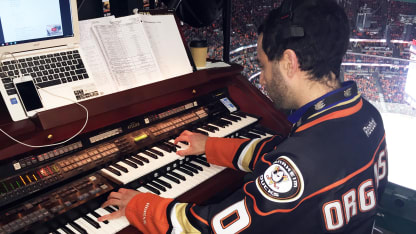
Upon arriving at Honda Center for his audition, Imber discovered the arena had a similar Roland Atelier organ to the one he had trained on at Dodger Stadium. Using the experience he'd gained at the ballpark, plus his sports knowledge, he played a few songs for members of the Ducks Game Entertainment department. They offered him the job on the spot.
His first performance was during the 2015 Stanley Cup Playoffs, Game 1 of Round 1, when the Ducks took on the Winnipeg Jets. Although the club's playoff run ended that year with a Game 7 loss to the Blackhawks in the Western Conference Final, it was decided that Imber would stay on for the next regular season. Ever since his first night high atop the arena, Imber has worked to refine his approach and better his understanding of the flow of the game.
"It's great to see him coming into his own," says Ducks Director of Production and Entertainment Rich Cooley. "He's fitting well into the philosophy of how the franchise wants to be portrayed."
For each game, Imber's role requires him to keep one eye on the ice and one finger on the pulse of the fan base, though his hands are on the keyboard, ready to play when called upon.
The intervals where Imber interjects the organ sounds come throughout the game and include the accompaniment of pregame video packages, when penalties are called and the scoring announcements after a Ducks goal. Everything Imber plays is both predetermined and on the fly, as he gauges the tone of the game and the call on the ice and combines those with his deep repertoire to play just the right song.
If there's a post-whistle scuffle behind the net that leads to penalties, Imber might play, "Kung Fu Fighting." When the Ducks are on the penalty kill, "Phantom of the Opera" likely fills the arena. If the Ducks are ahead in a game, the theme from "DuckTales" likely makes an appearance. And if the home team loses, as they did that night against Edmonton, Imber keeps it positive by playing "Tomorrow," from the musical "Annie" as the players exit the ice.
"The most challenging part is to associate certain songs with non-traditional moments," Imber says. "I often like to use a play on words."
That technique of Imber's is most evident when he plays his two-second "goal flourish" after Ducks PA announcer Phil Hulett announces the scoring for a Ducks goal. If defenseman Cam Fowler scores from the point, fans will hear a few notes of "Free Bird." If captain Ryan Getzlaf gets the Ducks on the board, Imber will play the theme from "King of the Hill."
Imber is well-versed in the history of the organ, and for an art form that may mostly be associated with the sport of baseball, it's hockey that has embraced and integrated the instrument into the in-game experience. The first known use of an organ at any sporting event was when Chicago Stadium, also known as "The Madhouse on Madison," opened in 1929, housing a nearly 4,000-pipe Barton organ. As part of his passion for playing, Imber keeps up with his NHL counterparts, stating that nearly all 30 teams, including every team in the Pacific Division, utilizes an organist in their arenas at least part time.
When he's not at the organ bench, Imber is a high school basketball referee, a role he says is significantly useful in helping him interpret the officials' actions during a hockey game. In the offseason, he runs
closecallsports.com
, a website that helps fans better understand the rules of baseball.
But when the Ducks are playing, Imber takes his seat up in the rafters, with songs at the ready for whatever the often unpredictable game of hockey may bring.
"I love the creativity," Imber says. I love the opportunity to come up with new ways to integrate live music with the sports experience."
Follow Imber on Twitter at @GilImber


